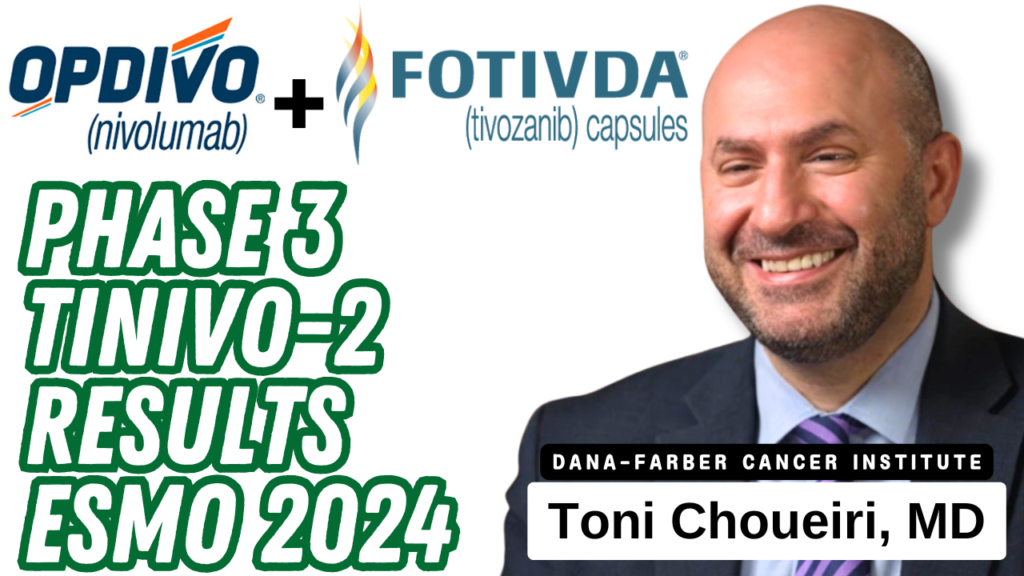AVEO Oncology, a subsidiary of LG Chem, has announced the acceptance of its Phase 3 TiNivo-2 trial for a Proffered Paper oral presentation at the 2024 European Society for Medical Oncology (ESMO) Congress, taking place in Barcelona, Spain, from September 13-17.
The oral presentation will provide key results from the TiNivo-2 clinical trial, which evaluated the efficacy and safety of combining nivolumab, a PD-1 checkpoint inhibitor, with FOTIVDA® (tivozanib), a VEGFR tyrosine kinase inhibitor (TKI). The study compared the effects of this combination to standard dose tivozanib monotherapy in patients with metastatic renal cell carcinoma (RCC) who had progressed after prior immune checkpoint inhibitor (ICI) treatment.
TiNivo-2 Clinical Trial Overview
The TiNivo-2 Phase 3 trial investigated two dosing regimens:
- Low-dose tivozanib (0.89 mg) combined with nivolumab versus
- Standard-dose tivozanib (1.34 mg) monotherapy.
The trial focused on RCC patients in the second-line setting after ICI combination treatments or the third-line setting following prior ICI treatment. The objective was to assess whether the addition of nivolumab could provide improved therapeutic benefit compared to tivozanib monotherapy.
Key Safety Information for FOTIVDA (Tivozanib)
- Hypertension
- Occurred in 45% of patients (22% ≥ Grade 3).
- Hypertensive crises reported in 0.8%.
- Initiation in patients with uncontrolled hypertension is contraindicated. Regular monitoring is essential, and persistent hypertension should be managed by reducing the dose or discontinuing treatment.
- Cardiac Failures and Ischemia
- Cardiac failure was observed in 1.6% of patients (1% ≥ Grade 3), with 0.6% of events being fatal.
- Cardiac ischemia occurred in 3.2% of patients, with 0.4% fatal outcomes. Monitoring is critical, and treatment should be discontinued in severe cases.
- Arterial and Venous Thromboembolism
- Arterial thromboembolic events occurred in 2.0% of patients, with 0.1% leading to death from ischemic stroke.
- Venous thromboembolism (VTE) was observed in 2.4% of patients, including 0.3% fatal events. At-risk patients should be closely monitored.
- Hemorrhagic Events
- Bleeding events were reported in 11% of patients, with 0.2% resulting in fatalities. Caution is advised for patients with bleeding risk.
- Proteinuria
- Proteinuria occurred in 8% of patients (2% ≥ Grade 3). Regular monitoring and dose adjustments are necessary for moderate to severe cases.
- Gastrointestinal (GI) Perforation
- Rare but serious GI perforations have been reported, including fatal cases. Monitoring is required throughout treatment.
- Thyroid Dysfunction
- Reported in 11% of patients, requiring thyroid function monitoring before and during therapy.
- Wound Healing Complications
- FOTIVDA should be withheld for 24 days prior to elective surgery and for at least two weeks after major surgery to ensure proper wound healing.
- Reversible Posterior Leukoencephalopathy Syndrome (RPLS)
- RPLS has been reported. Patients with symptoms such as seizures, headache, or visual disturbances should be evaluated immediately, and treatment should be discontinued if diagnosed.
- Embryo-Fetal Toxicity
- FOTIVDA can cause harm to a developing fetus. Women should avoid becoming pregnant during treatment and for one month after the last dose. Men with female partners of reproductive potential should use effective contraception.
- Allergic Reaction to Tartrazine
- FOTIVDA 0.89 mg capsules contain FD&C Yellow No. 5 (tartrazine), which may cause allergic reactions, including bronchial asthma, in susceptible patients.
Adverse Reactions
Common adverse reactions reported with FOTIVDA include:
- Fatigue/asthenia
- Hypertension
- Diarrhea
- Decreased appetite
- Nausea
- Dysphonia
- Hypothyroidism
- Cough
- Stomatitis
Serious adverse reactions include:
- Bleeding (3.5%)
- Venous thromboembolism (3.5%)
- Arterial thromboembolism (2.9%)
- Acute kidney injury (2.3%)
- Hepatobiliary disorders (2.3%)
Drug Interactions
- FOTIVDA should not be coadministered with strong CYP3A4 inducers due to potential interactions.
Conclusion
The TiNivo-2 trial results, presented at the upcoming ESMO 2024 Congress, are expected to provide valuable insights into the treatment of RCC patients who have progressed following prior ICI therapy. For oncologists, the trial data will guide decision-making in second- and third-line treatment strategies, particularly with respect to the efficacy and safety profile of the combination therapy.
The presentation will be delivered by Dr. Toni Choueiri, Director of the Lank Center for Genitourinary Oncology at Dana-Farber Cancer Institute, and will highlight key findings from the study.
Presentation Details:
- Title: Tivozanib Plus Nivolumab vs Tivozanib Monotherapy in Patients With Metastatic Renal Cell Carcinoma Following an Immune Checkpoint Inhibitor: Results of the Phase 3 TiNivo-2 Study
- Speaker: Dr. Toni Choueiri, Dana-Farber Cancer Institute
- Presentation Number: LBA73
- Session: Proffered Paper Session 1: GU Tumors, Non-Prostate
- Date & Time: Friday, September 13, 2024, from 2:00 – 2:10 pm CET
Related Articles On OncologyTube
AVEO Oncology, an LG Chem company, Announces Acceptance of Late-Breaking Oral Presentation of TiNivo-2 Results at ESMO 2024
References
. ClinicalTrials.gov. Study to Compare Tivozanib in Combination with Nivolumab to Tivozanib Monotherapy in Subjects with Renal Cell Carcinoma. Accessed July 12,
2024. https://clinicaltrials.gov/ct2/show/NCT04987203
- . FOTIVDA (tivozanib)[https://www.fotivda.com/fotivdapi.pdf].Boston, MA: AVEO Pharmaceuticals, Inc.
- . OPDIVO (nivolumab)[https://packageinserts.bms.com/pi/pi_opdivo.pdf ].Princeton, NJ: Bristol-Myers Squibb Company.

